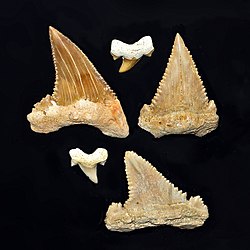Palaeocarcharodon
|
Palaeocarcharodon Temporal range: Paleocene |
|
|---|---|
 |
|
| Fossil teeth of Palaeocarcharodon orientalis from Khouribga (Morocco) | |
| Scientific classification | |
| Kingdom: | Animalia |
| Phylum: | Chordata |
| Class: | Chondrichthyes |
| Subclass: | Elasmobranchii |
| Order: | Lamniformes |
| Family: | Cretoxyrhinidae |
| Genus: |
Palaeocarcharodon Casieer, 1960 |
| Binomial name | |
|
Palaeocarcharodon orientalis (Sinzow, 1899) |
|
Palaeocarcharodon, also known as the pygmy white shark, is a genus of sharks in the family Cretoxyrhinidae. Palaeocarcharodon orientalis is the only species of this genus. These sharks lived in the Paleocene, from 61.7 to 55.8 Ma.
Since the fossil record of Palaeocarcharodon only relies on teeth in many sizes, much is unknown about the size and appearance of these sharks.
Teeth of Palaeocarcharodon are triangular, labio-lingually compressed, with quite irregular serrations and serrate lateral cusplets. They can reach a size of about 3–6 centimetres (1.2–2.4 in).
These sharks are possibly the ancestors of the Great White Shark (Carcharodon carcharias) and Megalodon (Carcharodon megalodon), as both these species have tooth serrations very similar to the serrations of Palaeocarcharodon. On the contrary Palaeocarcharodon has two cusps at the base of the main tooth, while the teeth of Great White Shark and Megalodon lack said small points. Currently, Paleocarcharodon is viewed as a "failed prototype" of the great white shark, that descended from Cretolamna and achieved its similarities to the great white shark (also a distant descendant of Cretolamna) as a result of convergent evolution.
Fossils of Palaeocarcharodon have been found all over the world, especially in the Paleocene fossil sediments of the Northern hemisphere (North & Western Africa, Russia and United States.
...
Wikipedia
